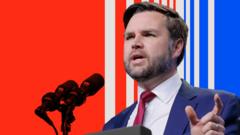JD Vance's recent remarks highlight a significant ideological shift in U.S. foreign policy, prioritizing American interests over traditional alliances. His dual critique of both European inaction and Ukrainian gratitude sets the stage for a new era in international relations.
JD Vance's "America First" Philosophy Challenges Global Alliances

JD Vance's "America First" Philosophy Challenges Global Alliances
The Vice President's unconventional approach to foreign policy raises eyebrows and questions about America's role in global conflicts, particularly the Ukraine crisis.
JD Vance, the U.S. Vice President, has generated considerable discourse on his foreign policy stance, particularly regarding the Ukraine conflict. His recent statements at the Munich Security Conference startled many, as he refrained from addressing the ongoing war directly. Instead, Vance took a bold approach, lambasting European allies for their perceived failures in immigration and free speech, claiming they disregard the voices of their citizens. “If you are running in fear of your own voters, there is nothing America can do for you,” he asserted.
This rhetoric marks a significant departure from traditional bipartisan foreign policy perspectives and underscores Vance's alignment with Donald Trump's "America First" ideology, reshaping how the U.S. engages with global partners. His ensuing confrontation with Ukrainian President Volodymyr Zelensky, where he accused the leader of ingratitude, further emphasizes a prioritization of domestic over international issues. Critics argue that such an approach neglects the complexities of global governance, particularly in supporting allies facing aggression.
Vance rose from modest beginnings, authoring the memoir "Hillbilly Elegy," which brought national attention to him. His reevaluation of earlier positions, originally scoped as a "Never Trumper," highlights his evolving ideology, increasingly critical of elites responsible for the challenges facing American workers. Notably, he frames issues such as illegal immigration and the economic struggles of rural America as interlinked with broader foreign policy decisions.
As he continues to advocate for prioritizing American citizens' needs over global engagements—like the war in Ukraine—Vance aligns himself with an audience increasingly critical of aiding foreign nations at the expense of domestic concerns. His tense exchange with Zelensky and dismissal of potential peacekeeping troop deployments reflect his approach, which seems to minimize moral assessments of international conflicts.
On social media, Vance's presence indicates a genuine engagement with a demographic that values unconventional discourse. His assertions navigate a tightrope between established norms and radical reinterpretations of U.S. responsibilities abroad. Many observers believe this trajectory could significantly alter both domestic perceptions of foreign policy and international relationships.
With looming challenges such as the rising threat from China, the Vice President's public relations strategy is set against a backdrop of urgent calls for reassessment of American priorities. His positions prompt critical conversations about the future of U.S. engagement on the world stage, especially with European allies navigating their own crises. As Vance’s influence grows, so too does the discourse on what "America First" genuinely entails in a complex and interconnected world.





















